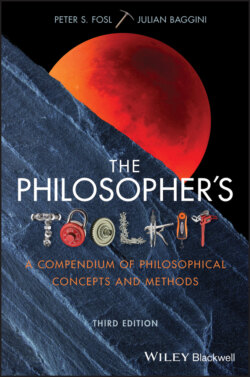Читать книгу The Philosopher's Toolkit - Julian Baggini, Julian Baggini - Страница 35
1.4 Validity and soundness
ОглавлениеIn his book, The Unnatural Nature of Science, the eminent British biologist Lewis Wolpert (b. 1929) argued that the one thing that unites almost all of the sciences is that they often fly in the face of common sense. Philosophy, however, may exceed even the (other?) sciences on this point. Its theories, conclusions, and terms can at times be extraordinarily counterintuitive and contrary to ordinary ways of thinking, doing and speaking.
Take, for example, the word ‘valid’. In everyday speech, people talk about someone ‘making a valid point’ or ‘having a valid opinion’. In philosophical speech, however, the word ‘valid’ is reserved exclusively for arguments. More surprisingly, a valid argument can look like this:
1 All blocks of cheese are more intelligent than any philosophy student.
2 Meg the cat is a block of cheese.
3 Therefore, Meg the cat is more intelligent than any philosophy student.
All utter nonsense, you may think, but from a strictly logical point of view this is a perfect example of a valid argument. How can that be so?
